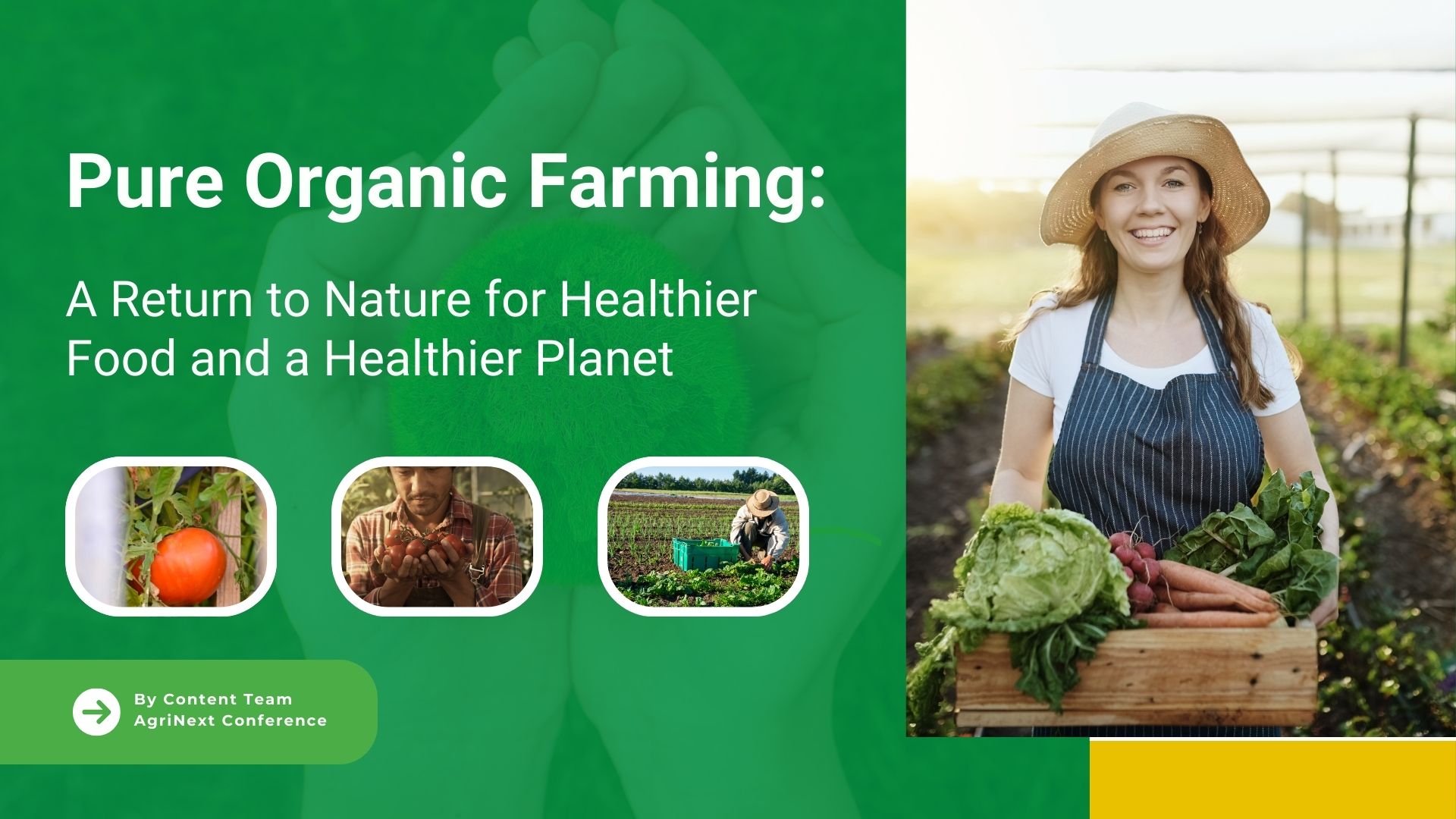
Introduction
Organic farming is an agricultural method that focuses on growing food using natural substances and processes. Unlike conventional farming, which often relies on synthetic chemicals, fertilizers, and genetically modified organisms (GMOs), organic farming seeks to work in harmony with nature. This approach not only produces healthier food but also promotes a healthier environment.
Background
Organic farming has deep roots in traditional farming practices that humans have used for thousands of years. However, the formal organic farming movement began in the early 20th century as a response to the industrialization of agriculture. Pioneers like Sir Albert Howard, Rudolf Steiner, and J.I. Rodale were instrumental in developing and promoting the principles of organic farming.
Sir Albert Howard: Often referred to as the father of modern organic agriculture, he emphasized the importance of maintaining soil health.
Rudolf Steiner: Founded the biodynamic farming movement, which integrates spiritual and ecological practices.
J.I. Rodale: A key figure in bringing organic farming to the United States, he founded the Rodale Institute and popularized organic practices through publications and research.
Principles of Organic Farming
Organic farming is guided by four main principles.
Health: Organic farming focuses on maintaining and improving the health of soil, plants,
animals, and humans. By avoiding synthetic chemicals, organic farming helps to ensure that food is free from harmful residues and rich in nutrients.
Ecology: Organic farming works with natural cycles and processes. This means promoting
biodiversity, using crop rotations, and integrating natural pest management strategies.
Fairness: Organic farming practices ensure fairness and respect for the shared environment and
life opportunities. This includes fair treatment of farm workers and animals.
Care: Organic farming is managed in a precautionary and responsible manner to protect the
health and well-being of current and future generations.
Benefits of Organic Farming
Environmental: Reduces pollution, conserves water, reduces soil erosion, increases soil fertility, and
uses less energy.
Health: Organic farming avoids synthetic pesticides and fertilizers, promoting healthier food
choices.
Economic: Can be cost-effective in the long run due to lower input costs and premium market
prices for organic products.
Organic Farming Practices
Challenges of Organic Farming
Crop Rotation: Alternating the types of crops grown in each field to maintain soil fertility
and health.
Green Manure and Cover Crops: Growing plants that add nutrients to the soil and prevent erosion.
Composting: Using decomposed organic matter to improve soil health.
Biological Pest Control: Using natural predators to control pest populations.
Yield: Organic farms often produce lower yields compared to conventional farms.
Labour: Requires more manual labour for tasks like weeding and pest control.
Market Access: Farmers may face challenges in accessing markets that pay premium prices for organic
produce.
Real-Life Example: Polyface Farm
Polyface Farm, located in Virginia’s Shenandoah Valley, is a prime example of successful organic farming. The farm, run by Joel Salatin and his family, follows sustainable and organic practices that prioritize soil health, animal welfare, and ecological balance.
Key Practices at Polyface Farm
Grazing:Polyface Farm uses a rotational grazing system for their livestock. Cattle, chickens,
pigs, and other animals are moved regularly to fresh pasture. This mimics natural grazing patterns, prevents overgrazing, and allows pastures to recover and regenerate.The manure left by the animals enriches the soil, promoting healthy grass growth without the need for synthetic fertilizers.
Integration of Livestock and Crops: The farm integrates livestock and crop production in a synergistic way. Chickens follow cattle in the pasture, eating insects and parasites that could harm the cattle.
This natural pest control method reduces the need for chemical treatments and improves the health of the animals.Pigs are used to till and fertilize the soil in wooded areas, turning them into productive pastures or crop fields.
Use of Natural Resources: Polyface Farm makes extensive use of natural resources and local inputs. For example, they use portable shelters and fencing to move animals around the farm efficiently, reducing the need for permanent infrastructure and minimizing environmental impact.They also collect and store rainwater for irrigation, reducing dependency on external water sources.
Benefits Observed at Polyface Farm
Environmental: By avoiding synthetic chemicals and fertilizers, the farm maintains healthy soil,
promotes biodiversity, and reduces pollution. The rotational grazing system enhances soil fertility and prevents erosion.
Economic: Polyface Farm has achieved economic sustainability by selling high-quality, organic
products directly to consumers. This direct marketing approach allows them to receive premium prices and build strong relationships with their customers.
Health: The farm produces nutrient-rich, chemical-free food that supports the health of
consumers. Their organic practices ensure that the food is free from harmful residues.
Recognition and Impact
Polyface Farm has gained national and international recognition as a model for sustainable and organic farming. Joel Salatin has authored several books and frequently speaks about their farming methods, inspiring farmers around the world to adopt similar practices. The farm’s success demonstrates that organic farming can be both environmentally sustainable and economically viable.
Conclusion
Organic farming is more than just a method of agriculture; it’s a commitment to working in harmony with nature to produce food that is healthy for both people and the planet. By focusing on natural processes, avoiding synthetic chemicals, and promoting biodiversity, organic farming offers a sustainable alternative to conventional agricultural practices. Real-life examples like Polyface Farm demonstrate that organic farming can be both environmentally and economically sustainable.
Call to Action
As consumers, we have the power to support and promote organic farming. Here are a few ways you can get involved:
Buy Organic: Choose organic products whenever possible. Your purchases support farmers who are committed to sustainable practices.
Support Local Farmers: Visit farmers’ markets and buy directly from organic farmers in your area.
Grow Your Own Food: Even a small garden can make a difference. Try growing your own vegetables and herbs using organic methods.
Educate Yourself and Others: Learn more about the benefits of organic farming and share this knowledge with friends and family.
Advocate for Policy Change: Support policies and initiatives that promote sustainable agriculture and protect the environment.
By making small changes in our purchasing and eating habits, we can contribute to a larger movement towards a healthier and more sustainable future. Let’s take action today for the well-being of our planet and future generations.
Upcoming AgriNext Awards,Conference & Expo: Supporting Organic Farming
The upcoming AgriNext Awards conference & Expo is set to be a pivotal event for the organic farming community, bringing together farmers, researchers, policymakers, and industry leaders dedicated to advancing sustainable agriculture. This conference will showcase the latest innovations in organic farming techniques, share success stories from around the globe, and provide a platform for networking and collaboration.
Attendees will have the opportunity to attend workshops, panel discussions, and exhibitions that highlight the benefits and challenges of organic farming.
By fostering a collaborative environment, AgriNext aims to empower farmers with the knowledge and resources needed to adopt and improve organic practices, ultimately contributing to a healthier planet and more resilient food systems.
Signup For AgriNext Conference Newsletter

